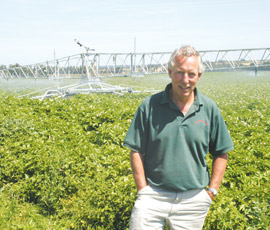Benchmarking tool for irrigation users launched

Potato growers could save money, boost yields and help the environment through a new irrigation benchmarking tool.
Although irrigation benchmarking is common in Australia and Spain, this DEFRA-funded initiative is the first of its kind in the UK. Led by Cranfield University, it will enable farmers to compare their farm and individual field performance against others, identify best practice and improve irrigation efficiencies.
“Water is entrenched in so many parts of the production system – this is not just about using less water, it is about getting the usage right,” says Jerry Knox, principal research fellow at Cranfield University. “With rising energy costs for irrigation pumping, coupled with increasing limitations in water availability and reliability, benchmarking may well help UK growers increase their water productivity and profitability, while minimising their environmental footprint.”
Following an initial trial with nine growers in Shropshire, Dr Knox developed a set of key indicators covering agricultural productivity, irrigation, financial and environmental performance. These include irrigation water use (cu m/ha), water use efficiency (t/cu m), water value (£/cu m), and environmental impact (energy use/t). Once growers have inputted the data for each field, they will be able to see how different fields compare, and how the whole farm compares with other, similar businesses. They will also receive a report card with traffic-light banding to illustrate where they are performing well, and which areas need attention.
“By benchmarking in this way, farmers will be able to target their strategies better,” says Dr Knox. In the trial, the growers attended a workshop and shared ideas of best practice, with McCain’s agronomists also offering pertinent advice. “We called it borrowing the good ideas of others to improve performance.” Examples include changing irrigation equipment, installing meters at key control points, and improving the timing of water application.
“Agronomists are the people who can help farmers get to the bottom of why they might be struggling in a particular area, or tease out best management practices and disseminate them to others. There is no better incentive to improve that by comparing yourself to other farmers, and having objective data to focus on is a good place to start.”
The free, confidential and anonymous tool is now being rolled out across the country via the UK Irrigation Association’s website, www.ukia.co.uk, as well as through producer groups and other stakeholders. “We need as many growers’ data in the system before we can start doing the benchmarking and producing scorecards later in the year. Growers can then input data each year to see the effect that any changes have had.”
Case study
Richard Solari was one of the first growers to trial the new benchmarking programme, and reckons it could yield considerable benefits to producers in the coming years. “It would be good to run it for two or three seasons as the better the information you put in, the more you will get out of it.”
He grows 100ha of potatoes at Heath House Farm, Beckbury, Shropshire, from free market earlies to contracted crisping, chipping and prepack varieties. “We are very attentive to our irrigation, measuring soil moisture, monitoring and planning. But the thing we’re not so good at keeping tabs on is the cost. And with energy costs going through the roof we need to keep an eye on that – my fuel bill was frightening when I put in the full year’s total, and I think benchmarking can really help with that.”
As part of a McCain grower’s group, Mr Solari meets other farmers frequently to discuss agronomy and all aspects of the crop. “There are so many elements involved in growing a crop of potatoes, and you can pull all sorts of information out of the data.”
For example, one field of potatoes yielded exceptionally well despite not receiving much water, while another yielded poorly even though it was well irrigated. “Last year we applied 200mm/acre to our maincrop Maris Piper. Industry costs for 25mm vary from £35/acre to £65/acre, so at 200mm of irrigation, that’s a range from £280/acre to £520/acre. It really makes you think, which is the whole point of the exercise.”
Read more on the drought in England and Wales on our dedicated home page.

